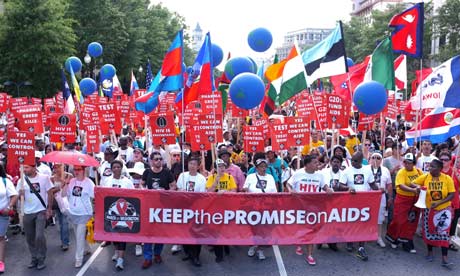
The end of the Aids epidemic is in sight, with scientific developments that will allow millions to be treated and prevent the spread of infection, but delegates at the International Aids Conference opening in Washington heard that poverty, gender inequality, homophobia and prejudice and funding shortages still put millions more at risk.
Michel Sidibé, executive director of UNAids said in his opening address that for the first time, more people are on treatment than need it – 8 million of 15 million – and the trajectory of infections had been broken with a worldwide decline of 20% since 2001.
However, he said, "It is outrageous that in 2012, when we have all the tools to beat the epidemic, we still have to fight prejudice, stigma, discrimination, exclusion and criminalisation, not only in homes, but in streets, police stations and courtrooms. This is impossible for me to understand."
Earlier, activists invaded a pre-opening briefing in protest at laws that forbid sex workers and drug users from entering the USA. The conference is being held in the US for the first times in two decades as a result of President Barack Obama lifting the ban on entry for people with HIV, but those in some of the most affected population have still not been able to attend.
A rival conference of sex workers in Kolkata has been accredited by the International Aids Society which organises the Aids conference as a "hub". Protesters at the Washington Convention Center sprang up out of the audience chanting "What about the sex workers?" and "Nothing about us without us."
Congresswoman Barbara Lee, who represents California's 9th district, and is one of the opening speakers at the conference, was involved in lifting the travel ban for people with HIV and is now introducing legislation to Congress to end the discrimination against sex workers and drug users.
"It was very important for me to work to help lift the travel ban to allow the conference to come to America after all these years," she said.
"We should have meaningful dialogue on sex workers and men who have sex with men, with transgender people and also with drug users. The legislation I introduced will do just that. It is an important step in the right direction but during this conference we need to discuss the prohibition and discrimination that still exists."
Talk at the conference is of the end of Aids, in the light of scientific breakthroughs particularly on the use of drug treatment to prevent the spread of infection. But, said Lee, unless these excluded populations are given help, "I don't know how we are going to see an end to Aids in our lifetime."
Money is also a major worry for those who see the end of Aids in sight. Sidibé spoke of "times of unprecedented political, financial, economic and social crisis. I am scared for the future of global solidarity. From many places in the developing world I am hearing: 'We cannot afford to keep our promises. We have our own problems at home.' Financial commitment from developed countries is declining. We have a funding gap of $7bn per year for HIV. This gap is killing people. This is not a time for isolationism. It is a time for togetherness."
New World Bank president Jim Yong Kim, who 10 years ago at the World Health Organisation masterminded the early roll-out of drug treatment to people with HIV in poor countries, said in an opening address that he knew what the Aids activism movement was capable of achieving.
"I'm here to bring you both a pledge and a challenge," he said. "I pledge that the World Bank will work tirelessly with all of you here to drive the Aids fight forward until we win. And I challenge you to join me in harnessing the moral power and practical lessons that the Aids movement has produced to speed progress against that other global scourge, poverty."

